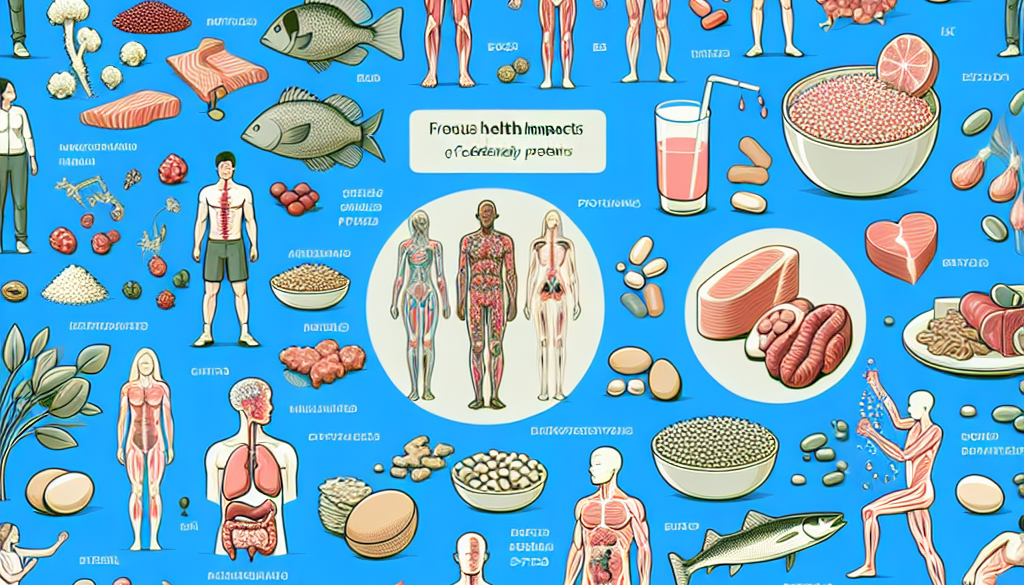Biological Activities of Dietary Proteins: Health Impacts
-
Table of Contents
- Dietary Proteins and Their Biological Activities: Exploring Health Impacts
- The Essential Role of Dietary Proteins
- Biological Activities of Dietary Proteins
- Antioxidant Properties
- Anti-inflammatory Effects
- Modulation of Gut Microbiota
- Impact on Satiety and Weight Management
- Regulation of Blood Sugar Levels
- Health Impacts of Dietary Proteins
- Supporting Muscle Growth and Maintenance
- Enhancing Bone Health
- Improving Cardiovascular Health
- Regulating Hormones and Enzymes
- Boosting Immune Function
- Case Studies and Statistics
- Conclusion
- Discover ETprotein’s High-Quality Protein Products
Dietary Proteins and Their Biological Activities: Exploring Health Impacts

Proteins are fundamental components of all living organisms and play a crucial role in various biological processes. As macronutrients in our diet, they are not only essential for the structure, function, and regulation of the body’s tissues and organs but also have a range of biological activities that can significantly impact health. This article delves into the multifaceted roles of dietary proteins and their influence on human health.
The Essential Role of Dietary Proteins
Dietary proteins are vital for life, providing the building blocks, in the form of amino acids, necessary for the construction and repair of body tissues. They are involved in numerous bodily functions, including:
- Cellular repair and regeneration
- Enzyme and hormone production
- Immune system function
- Energy provision when carbohydrates are scarce
- Maintenance of fluid and pH balance
Biological Activities of Dietary Proteins
Dietary proteins possess a range of biological activities that can influence health outcomes. These activities include but are not limited to:
- Antioxidant properties
- Anti-inflammatory effects
- Modulation of gut microbiota
- Impact on satiety and weight management
- Regulation of blood sugar levels
Antioxidant Properties
Some dietary proteins have antioxidant properties that help combat oxidative stress, a condition linked to chronic diseases such as cancer, diabetes, and heart disease. For example, whey protein contains high levels of cysteine, which boosts the production of glutathione, a potent antioxidant in the body.
Anti-inflammatory Effects
Chronic inflammation is a root cause of many diseases. Certain dietary proteins, such as those found in fatty fish, can have anti-inflammatory effects due to their omega-3 fatty acid content. These effects can help reduce the risk of conditions like arthritis and heart disease.
Modulation of Gut Microbiota
The gut microbiota plays a significant role in health and disease. Dietary proteins, particularly those from plant sources like legumes and grains, can promote the growth of beneficial gut bacteria, which in turn can enhance immune function and nutrient absorption.
Impact on Satiety and Weight Management
Proteins are more satiating than carbohydrates and fats, which can help in controlling appetite and managing body weight. High-protein diets are often used in weight loss programs to reduce hunger and preserve lean muscle mass.
Regulation of Blood Sugar Levels
Consuming protein with carbohydrate-rich foods can slow the absorption of sugar into the bloodstream, helping to regulate blood sugar levels and reduce the risk of type 2 diabetes.
Health Impacts of Dietary Proteins
The biological activities of dietary proteins can have profound effects on health. Here are some of the key health impacts:
- Supporting muscle growth and maintenance
- Enhancing bone health
- Improving cardiovascular health
- Regulating hormones and enzymes
- Boosting immune function
Supporting Muscle Growth and Maintenance
Proteins are essential for muscle growth and the maintenance of muscle mass, which is particularly important for aging populations to prevent sarcopenia (age-related muscle loss).
Enhancing Bone Health
Adequate protein intake is associated with improved bone health and a lower risk of osteoporosis. Proteins help maintain bone density and strength, especially when combined with other nutrients like calcium and vitamin D.
Improving Cardiovascular Health
Certain proteins, such as those from plant sources and fish, can improve heart health by reducing blood pressure, cholesterol levels, and the risk of stroke.
Regulating Hormones and Enzymes
Proteins play a critical role in the production of hormones and enzymes that regulate various bodily functions, including metabolism, digestion, and the stress response.
Boosting Immune Function
Dietary proteins contribute to a robust immune system by supporting the production of antibodies and immune cells that defend against pathogens.
Case Studies and Statistics
Research has consistently demonstrated the health benefits of dietary proteins. For instance, a study published in the “American Journal of Clinical Nutrition” found that higher protein intake was associated with a lower risk of hypertension. Another study in the “Journal of Nutrition” showed that a high-protein diet could improve bone density in postmenopausal women.
Statistics from the National Health and Nutrition Examination Survey (NHANES) indicate that most Americans meet or exceed the recommended daily intake of protein. However, the distribution of protein intake throughout the day and the sources of protein (animal vs. plant-based) can still be optimized for better health outcomes.
Conclusion
The biological activities of dietary proteins are diverse and have significant implications for health. From their antioxidant and anti-inflammatory properties to their role in weight management and blood sugar regulation, proteins are more than just building blocks for the body. They are active participants in maintaining and improving our health. Ensuring a balanced intake of high-quality proteins from a variety of sources is crucial for optimal health.
Discover ETprotein’s High-Quality Protein Products
If you’re looking to incorporate high-quality dietary proteins into your diet, ETprotein offers a range of organic bulk vegan protein and plant proteins that can meet your needs. Their products, including Organic rice protein, clear rice protein, pea protein, clear pea protein, and more, are characterized by a neutral taste and non-GMO, allergen-free attributes. Ideal for various industries, ETprotein’s offerings can help you achieve your health and nutrition goals.
About ETprotein:
ETprotein, a reputable protein Chinese factory manufacturer and supplier, is renowned for producing, stocking, exporting, and delivering the highest quality organic bulk vegan protein and plant proteins. They include Organic rice protein, clear rice protein, pea protein, clear pea protein, pumpkin seed protein, sunflower seed protein, mung bean protein, peanut protein etc. Their offerings, characterized by a neutral taste, non-GMO, allergen-free attributes, cater to a diverse range of industries. They serve nutraceutical, pharmaceutical, cosmeceutical, veterinary, as well as food and beverage finished product distributors, traders, and manufacturers across Europe, USA, Canada, Australia, Thailand, Japan, Korea, Brazil, and Chile, among others.
ETprotein specialization includes exporting and delivering tailor-made protein powder and finished nutritional supplements. Their extensive product range covers sectors like Food and Beverage, Sports Nutrition, Weight Management, Dietary Supplements, Health and Wellness Products, and Infant Formula, ensuring comprehensive solutions to meet all your protein needs.
As a trusted company by leading global food and beverage brands and Fortune 500 companies, ETprotein reinforces China’s reputation in the global arena. For more information or to sample their products, please contact them and email sales(at)ETprotein.com today.












